During June’s DC You relaunch, writer Mark Russell and illustrator Ben Caldwell shipped the relaunch of a little known series called Prez. The politically charged dramedy stars Beth Ross, a meme-able teenage girl who gets elected president and is forced to face the consequences our current political system and relationship with technology have wrought.
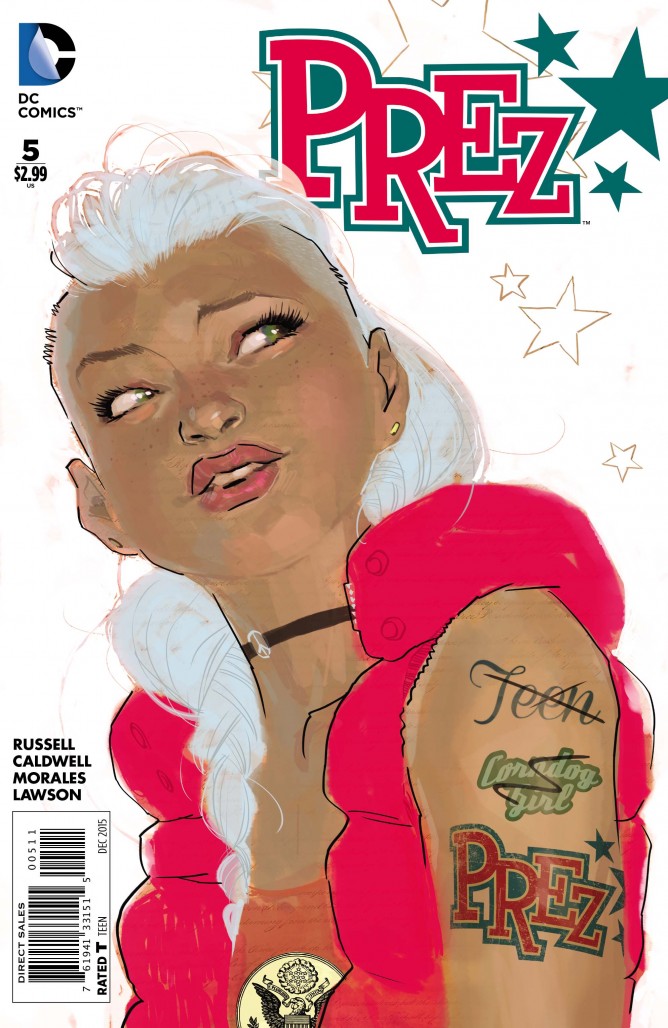
Prez is in equal measures hilarious, depressing, and profound. The fifth issue in the series hits store shelves today, and at this year’s New York Comic Con, The Comics Beat had a chance to catch up with Mark and Ben to talk about what lessons they hope to imbibe to readers through the series.
Alex Lu: Prez has been an absolute pleasure to read. How did you both get involved with the comic?
Mark Russell: It was the weirdest phone call I’ve ever gotten. I’ve never worked in comics. I’ve never written a comic before except God is Disappointed in You which is not really a comic book– it’s a book with cartoons in it. It’s kind of my one foray into the comic book world, but I get a call in the middle of the afternoon from an editor at DC, a friend of a friend. She asked me if I’d be interested in writing Prez, which I’d never heard of, a reboot of some obscure 1974 comic that they were interested in rebooting for the election cycle that’s coming up.
The offer was so off the wall and intriguing that I couldn’t say no. I wrote them a pitch saying how I would handle a teenage president, sent it back, and they loved the pitch. They said “yes, that’s exactly what we want.” Two months later, I was in Burbank at DC, having lunch with all the Batmobiles. If you’d told me I would be doing that two months before I would’ve been like–
Ben Caldwell: Where’s my Batmobile?!
Russell: Right? I feel like my story is almost as crazy as Prez itself. It happened very suddenly and very unexpectedly for me.
Caldwell: I’d been doing a few things for DC, and they were slowly escalating. Now that I think about it, they were all sort of these dystopian worlds. These 1984, Infinity Inc., Flock of Seagulls dystopias. I guess that’s why they called me up for it.
Lu: Well, it’s a very vibrant dystopia!
Caldwell: Yes, but it’s also a very sad book
Russell: It’s a very good looking dystopia. The world’s falling apart, but damn if it doesn’t look good doing it!
Lu: And taco drones! Thinking about it, the usage of drones is one of the more prominent themes in the series. You have the more innocuous ones like the taco delivery system, but you also have the beanbag boys, the drones that dehumanize mass murder. Do you think this reflects current drone policy? Where do you see things headed in the future?
Russell: The drone technology opens up this whole plethora of possibilities. Some of them are good, as you’ll be able to send things without physically going places. The downside, of course, is that you won’t need to physically go places to do bad things like murder people. That will make your emotional and moral distance from that action further and further and thus make it more likely to happen again.
If you look at the history of the 20th century, it’s really a history of us becoming more and more morally removed from the consequences of our actions. If you killed somebody in WWI, chances are you bayoneted them. You were up close, looking the person in the eye when you killed them. After that, it become more about remote warfare, using battleships, tanks, and airplanes to kill people. Now, you don’t even need to be on the same battlefield as your enemy. You can be at home on your beanbag chair in West Virginia playing on your X-Box while murdering hundreds of people in some foreign country.
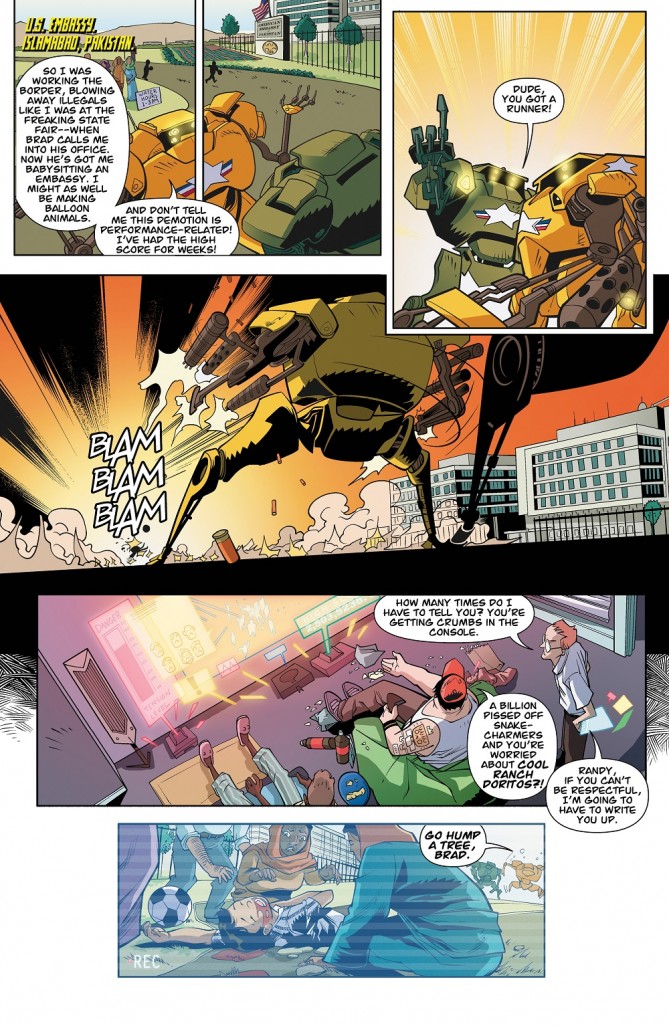
Caldwell: The technology is not necessarily good or bad in and of itself so much as it enables the things humans and institutions would do anyways. One of the big issues, though, is that there’s a certain immediacy and scale to it that forces it to escalate. With the gun debate, for example, there were zealots in the first century A.D. that would go on killing sprees with knives but they could only get so far. Now, we have guns and bombs that can escalate that much more quickly.
With drones, it’s not so much good or bad, but the amount of damage they can do if misused is such an extensive amount, and it can all happen before anyone has a chance to really think about what they’re doing.
Russell: A lot of what technology has done is…the major decisions of war have been less like preparing a nine course meal to sticking pizza rolls in the microwave. You make a decision and 30 seconds later, it’s done. We don’t really have that time of reflection to give ourselves the chance to dissuade ourselves from what we’re about to do. I think that’s what Twitter is– it’s like instant nuclear warfare. You put something out there and if it gets viral, you’re done.
Lu: So would you say that you’re wary of technology, then?
Russell: I am. I think that technology is really what drives history. Politics is just deciding how to rearrange the furniture that it’s placed in the room. I am wary because it takes people a while to figure out where this technology fits in our lives. Every time there’s a new technology, there’s this period of adjustment where everyone is figuring out how to make it work for them, and they all make horrible mistakes during that time.
The better the technology gets, the more destructive it gets, and the less of a grace period we have to figure things out before we destroy everything.
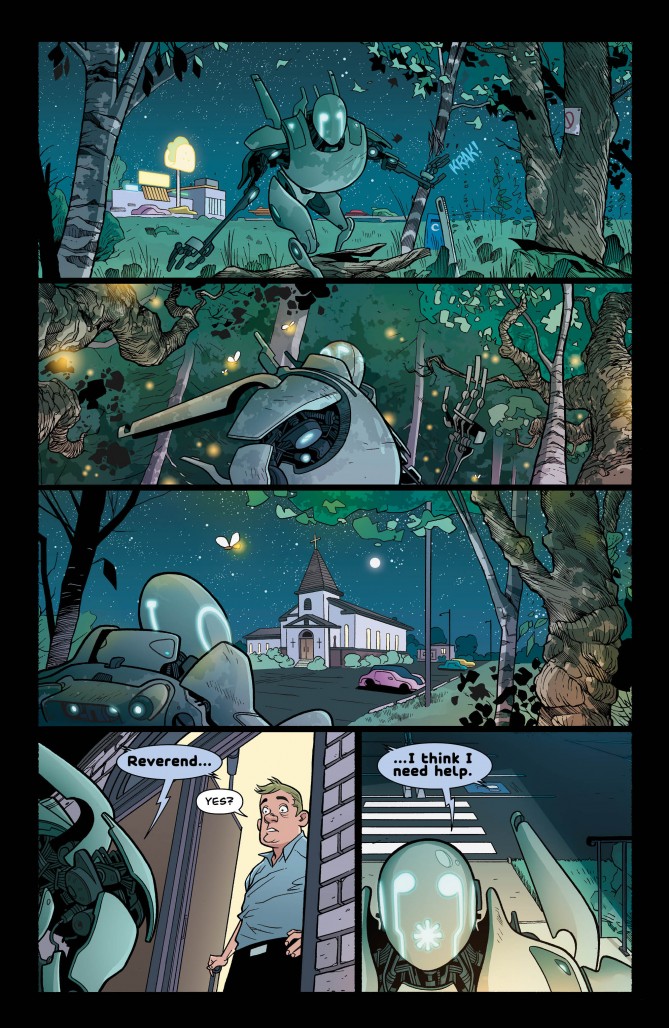
Lu: Is Prez a cautionary tale? Is it asking us to stop and reconsider our relationship to technology before our grace period runs out?
Russell: I don’t think there’s any stopping the advance of technology, nor do I want to stop it. I just want people to think about our current institutions and whether or not our institutions are made obsolete by technology. If they are, should we change our institutions to facilitate this new world we live in?
I think that most revolutions fail because people are thinking about this bright future…if they could just change the politics now they could facilitate the birth of a brighter future. The revolutions that succeed are the ones where the world has already changed, but the political and religious institutions haven’t realized it yet. If we get rid of them and just have institutions that reflect the world as it is now– that revolution has a chance to succeed.
I think Prez is very much about that. It’s about changing the institutions to match the world as we have it as opposed to trying to create some utopian world.
Caldwell: I’d say that, with Beth, it’s also very much about change in individuals. As you were saying Mark, in an earlier age, when people were trying to set up new governments, they had a certain amount of time to do it and they were people who had a background where they spent a lot of time thinking about these things.
Beth herself is an everywoman character, but she’s also atypical because of her father and her unique intellectual curiosities. She says she’s not ready to be president, but when the decisions come, whether she makes the right decisions or the wrong ones, she’s willing to commit to some sort of decision.
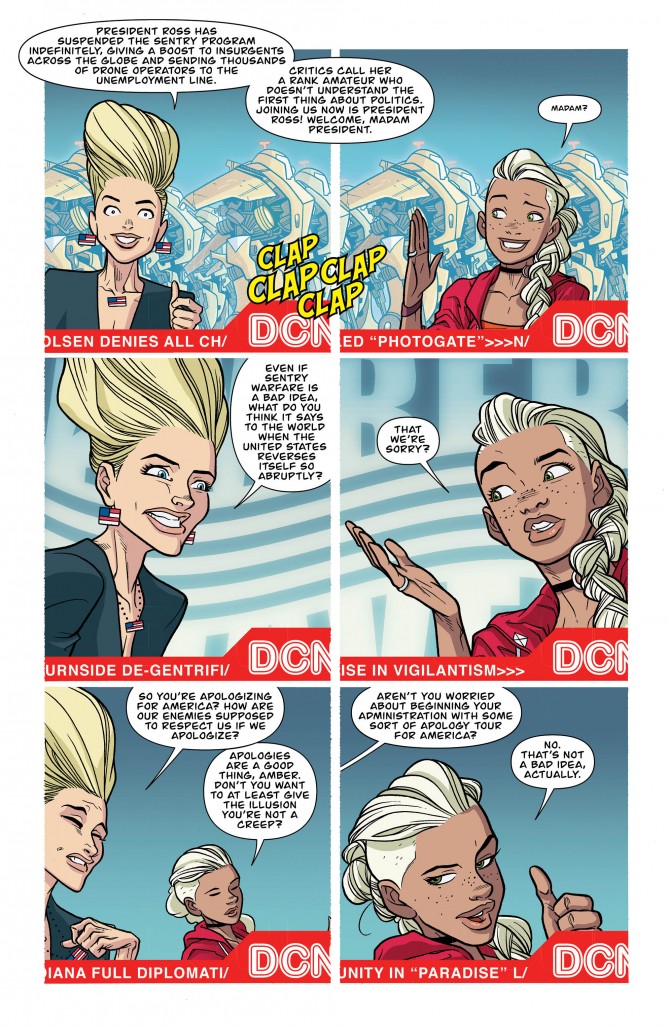
As a society in general in Prez, you’re looking at a society that’s not designed to inform its people. It’s there to entertain them. You have to wonder what Beth’s peers are like. We haven’t seen a lot of other people from her generation in the story yet, so you have to wonder how representative she is of them. Is this new society, technology, new social media, new military apparatus– is all this new creating a new type of person?
Russell: A lot of our institutions were created when this country was 99% farmland. If the farmland mentality is incorporated into our institutions, then you have a system where you need a few people at the top and then masses of people underneath, working the farm and picking the crops. Most of our systems are facilitated to hand the elites what they need and make sure we have enough people picking the crops.
I think that, in the post-technological age, that need is inverted. We’ve got global warming and resource depletion. The problems are big enough that the people who go to Ivy League schools won’t be enough to solve these problems. The problem is that half the people in the country are asking if you want fries with your shake for a living. Those are jobs that robots could do. What we need to do is unlock their potential and get them working on those big solutions, and the only way we can do that is by undoing the institutions that were created when we were a plantation based economy and recognizing that we are now an information based economy. We need to create institutions that will allow everyone to participate fully.
Caldwell: If only Prez billionaire Fred Wayne had some sort of program in mind that would involve transforming employment, education, and knowledge!
Lu: So do you both hope Prez will spark a revolution?
Russell: I hope it sparks the kind of revolution where it’s not like people are going out and throwing Molotov cocktails at cops, but the kind of revolution where we realize that our institutions need change to match the world as it is now.
Caldwell: I hope that what happens is that when people read Prez, they’ll have a laugh. Then, the next week, when someone has sex with a pig or a taco drone bill passes in the Senate, we’ve laid groundwork so that, without telling them anything they didn’t necessarily already know, we’ve framed events in such a way so that they say, “wait a second, that sounds familiar.”
Prez #5 is in stores now!


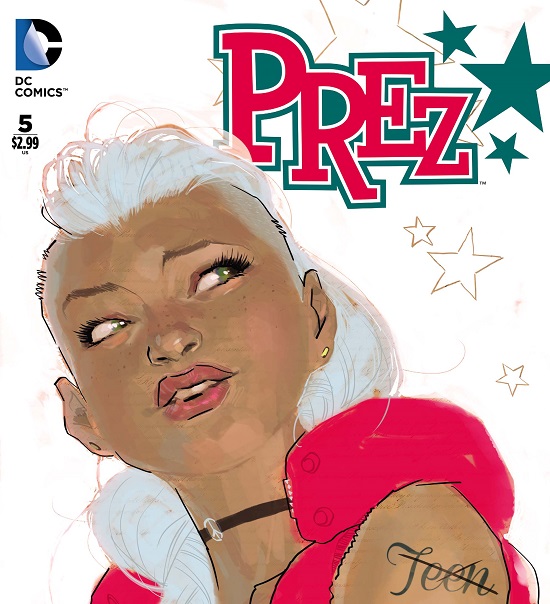

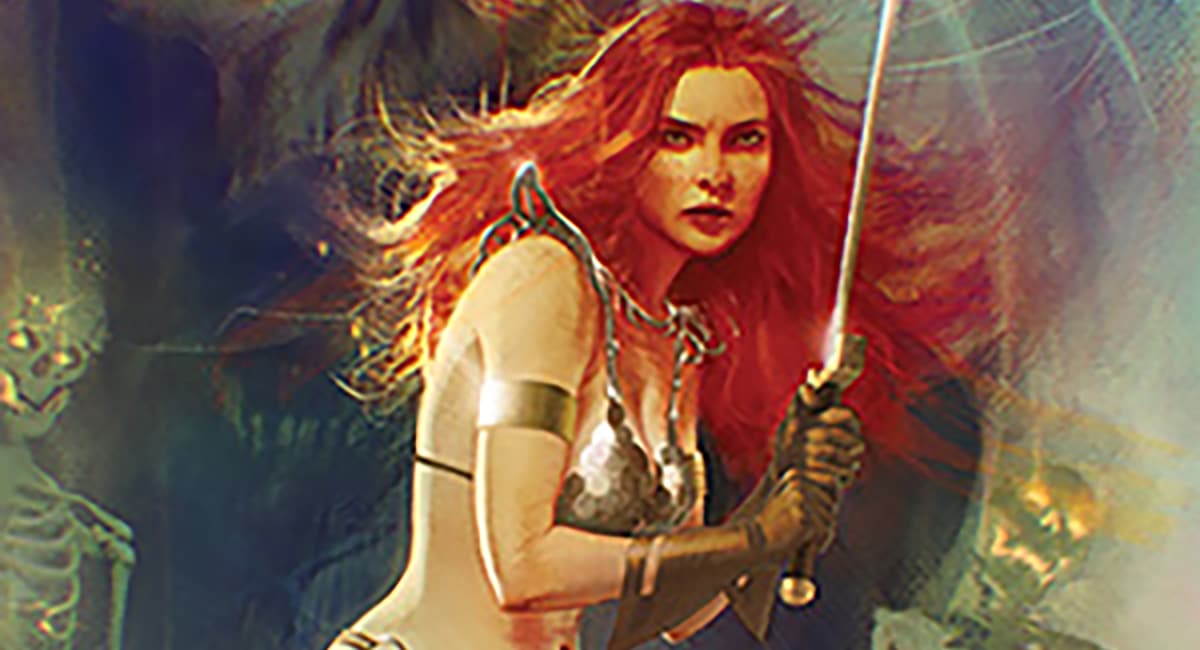
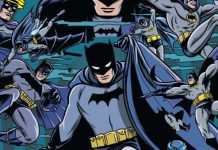



Just love this book- it’s brilliant and insightful. And Ben’s art is both gorgeous & fresh – as always.
Comments are closed.